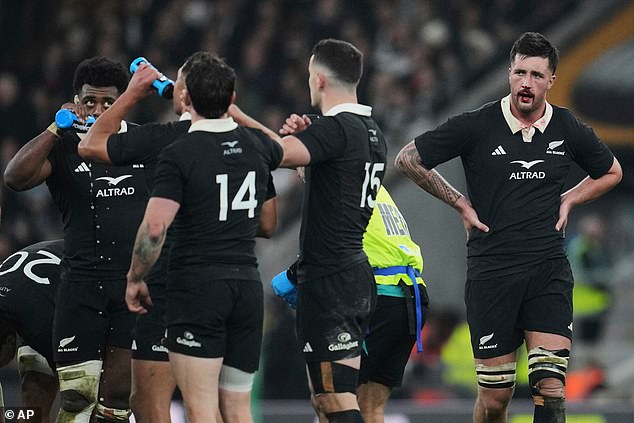Share this @internewscast.com
On my last visit to New Zealand, back in 2017 during the gripping Test series between the All Blacks and the British & Irish Lions, I found myself in the Wellington suburb of Miramar. My mission? To witness a first XV school rugby match between Scots College and Rongotai College, a spectacle that promised both sport and cultural immersion.
The allure of the game was undeniable, but so was the culture it embodied. Rugby is woven into the very fabric of New Zealand life. Watching the teams emerge, I was captivated by Rongotai’s haka and the exhilarating, audacious style of running rugby both teams showcased.
Despite the inclement weather, spectators packed the touchlines, three or four deep. Rongotai College boasts a storied rugby legacy, having produced nine All Blacks, including notable names like Ma’a Nonu and brothers Julian and Ardie Savea, who were part of the squad confronting the British & Irish Lions at the time.
Ardie Savea, who once led Rongotai as head boy in 2011, stood on the field at Twickenham against England that Saturday afternoon, embodying the proud rugby tradition of his alma mater while playing as an openside flanker for the All Blacks.
That day in Miramar was unforgettable. It was akin to experiencing a football match on Ipanema Beach or a cricket game at Mumbai’s Oval Maidan—sport in its purest, most spirited form. It was a testament to the heartbeat of a nation and its culture.
A columnist in the Wellington Dominion Post that same week encapsulated it perfectly: “New Zealand is so good at sport,” they wrote, “it’s as if the whole country is one big trophy cabinet with a few volcanoes, mountains, and national parks to fill in the rest of the space.”

New Zealand are proud of their rugby history and success, but there is a suggestion that they have lost their aura

England defeated what used to be a winning machine with clear identity 33-19 on Saturday
The All Blacks were a winning machine in that decade. New Zealand had an 87 per cent win rate from 2010 to 2019. In 54 Tests between winning the World Cup in 2011 and retaining it at Twickenham four years later, the All Blacks lost only three times, winning three consecutive Rugby Championship titles.
That win rate has dropped to 70 per cent in the years since 2019 and when they walked out at Twickenham on Saturday, it was against a background of suggestions that the All Blacks had lost their aura. The All Blacks had not lost at HQ since 2012 but many predicted the humiliation that would be visited upon them this time.
It was not just that South Africa assumed the mantle of the best team in the world some time ago – you only had to watch their stunning victory over France last week and the quality of the rugby to understand their dominance – but it was also that the All Blacks seemed to have lost some of their identity.
When you think of rugby beauty in the modern era, you think of Antoine Dupont and Siya Kolisi and you think of Cobus Reinach scoring that brilliant solo try at the Stade de France last weekend, spotting space near halfway, accelerating through a gap, chipping over Damian Penaud, and regathering to plunge over the try-line.
Where have you gone Jonah Lomu? Where have you gone Dan Carter, Richie McCaw and Ma’a Nonu? Where have you gone Sean Fitzpatrick? Where have you gone John Kirwan? A nation turns its lonely eyes to you.
In 2013, before a Test against England, a sign was pinned to the wall of the All Blacks team room which read: ‘We are the most dominant team in the history of the world.’ That boast is not theirs to make any more.
Now, other sides take them as their scalps. Ireland beat them for the first time in their history in Chicago in 2016. Argentina claimed their first victory over New Zealand in 2020 and have since repeated the feat in 2022, 2024 and 2025.

A nation turns its lonely eyes to its former stars in a time of struggle, having also suffered their biggest-ever defeat two months ago

It was a great joy to watch England, but there was sadness, too, in watching the All Blacks reduced to this
And it was only two months ago that New Zealand suffered their biggest defeat in their history when they were beaten 43-10 by South Africa in the Rugby Championship in Wellington.
‘Responsibility to the jersey and our history is huge,’ former All Black Jeff Wilson said recently. ‘Record-breaking losses can’t just be dismissed — they change things for ever.’
And so even if there was great joy in watching England win their 10th game in a row and demolish New Zealand on Saturday afternoon – they were 23-12 ahead even before Steve Borthwick brought on the Pom Squad 25 minutes from the end – there was sadness, too, in watching the All Blacks reduced to this.
It was like watching something dying. This felt like more than a defeat for the All Blacks. It felt like the death of an idea. It felt like the loss of a wonderful culture that has enthralled the world of sport. It felt like watching a magician’s tricks exposed. It felt like people laughing at him.
The All Blacks have been called, at various times in their history, the Invincibles and the Incomparables. This lot are more like the Inconsolables.
New Zealand were outplayed in every aspect of the game. There was only poignancy in the close-quarters handling that has been one of the trademarks of their dominance deserting them completely. To see Beauden Barrett reduced to a shadow of himself… there were times when you just wanted to look away.
Their two tries in the first half carried echoes of their beauty, particularly when scrum half Cam Roigard speared a pass out wide off one leg as he was falling to the ground ahead of New Zealand’s first score. A couple of line-breaks from Will Jordan set the pulse racing, too. Jordan’s consolation try 15 minutes from the end brought his team back to within six points of England.
But they were rare shafts of light. Another shocking handling error from the All Blacks was gleefully exploited by the marauding Henry Pollock and Tom Roebuck went over to make the final score 33-19. England were dancing on a grave. The headstone said: All Blacks.













